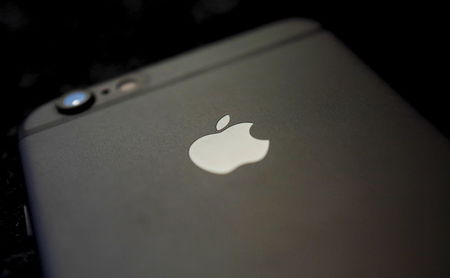UBS casts doubt on Apple’s FY25 iPhone ‘super-cycle’
2024.07.17 16:16

Investing.com – Analysts from UBS, a well-respected financial services company, issued an analyst note on Apple Inc (NASDAQ:), predicting the tech giant will deliver in-line results for June and September, while cautioning that the market’s optimism for FY25 may be misplaced.
UBS forecasts June 2024 revenues of $84.6 billion, a 3.5% year-on-year increase, with iPhone unit sales expected to reach 43 million, a 2% decrease year-on-year. The firm also anticipates that Mac sales will benefit from easy comparisons, driving their forecast to $7.5 billion.
Additionally, they predict that iPad revenue will grow by 10% year-on-year for the quarter.
Despite these predictions, UBS doubts the likelihood of an iPhone “super-cycle” in FY25, arguing that their analysis of smartphone demand by region, previous cycles, income demographic data, and carrier subsidies suggests a more modest cycle next year.
In addition, given Apple’s current price-to-earnings multiple of 33 times, UBS believes that unless EPS estimates increase significantly, the risk/reward is unfavorable.
Despite making minor adjustments to their estimates, UBS maintains that FY25 iPhone demand expectations are overly optimistic. They estimate that peak demand for iPhones will reach around 247 million units, significantly below the most bullish investors’ forecasts. UBS also notes that the market is pricing in iPhone units 15% above their 225 million forecast for FY25.
UBS’s analysis further suggests that global iPhone share would need to reach a record 22% to underwrite an AI supercycle or approximately 260 million iPhones in FY25. This would be a significant increase from the current 19% share, especially given increased competition from Huawei in China.
The note also highlights concerns around privacy, cost, and lack of applications as potential impediments to the success of a GenAI replacement cycle. They point out that almost 40% of respondents in a recent UBS Evidence Lab Smartphone Survey cited privacy as a concern. Price is also a crucial factor for consumers, and any attempt to raise iPhone prices could negatively impact demand.
UBS rated Apple as “neutral” with a price target of $190, reflecting a challenging growth backdrop, higher rates, and an undefined AI strategy.








